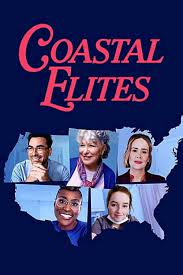
COASTAL ELITES
US, 2020, 88 minutes, Colour.
Bette Midler, Dan Leavy, Issa Rae, Sarah Paulson, Kaitlyn Dever.
Directed by Jay Roach.
This is a HBO production released in 2020. It was filmed during the early months of 2020, the beginnings of the pandemic, the last year of Trump’s administration. It was released first during the final months of the 2020 election campaign which led to Trump’s defeat, his accusations of a rigged election, the insurrection at the Capital on January 6, 2021.
This is a film preaching to the converted – Trump’s supporters will be irritated, offended, angered. Not converted.
The film is very strong in its condemnation of Trump, of his family, of VP Mike Pence, of Trump’s initial response to covid-19.
The film was directed by Jay Roach, who began with broad comedies with Mike Myers, Austin Powers. He then moved into political satire through drama, Recount on the 2000 election in Florida, Game Change on the 2008 financial crisis, Trumbo, All the Way (about LBJ) and Bombshell focusing on Roger Ailes of Fox News and the harassment accusations.
The film is a succession of five monologues, actors talking straight to camera, sometimes in one take. The actors are particularly successful in engaging the audience, articulating their characters, bringing a dramatic force to the monologues. To that extent, they are exemplary.
The film opens with a long monologue by Bette Midler as a Jewish matron from New York City, arrested by the police and addressing them, talking about her Jewish background, the lifestyle of Jewish women in New York City (with a touch of satire), but expressing her distrust and disgust with Donald Trump, moving into more aggressive language, taunting him. She is articulate in the Bette Midler style – showing that Bette Midler in her 70s still has a vigorous presence. Her character then engages with a Trump supporter, young, and her arguing the issues with him. Finally, she is going to the theatre, talks with the manager, raises issues of how Jewish mothers went to theatre to enjoy but also develop ideas. Afterwards, she is arrested.
The transition is to a much shorter monologue spoken by Dan Levy, prominent because of the success of the television series Schitt’s Creek. Levy is a gay man and draws on his own personal experience in this comic monologue about himself as an actor, auditioning for a role in the big budget superhero film with a gay superhero. His character is self-deprecating, talking about his career, small beginnings, his own personal life and relationships. He talks about the auditions, the way he handled the situation, the superhero talking to a young girl. And, contrary to audience expectations, he is continually called back. And there are his reflections on what it is to have a gay superhero in contemporary American cinema. However, at one stage, in the spirit of the film, he condemns VP Mike Pence for his stances, moral and religious, on gays in the military and on gay marriage.
The third monologue is by actress in film and television, African-American, Issa Rae. This monologue is even more explicit in its criticism of Donald Trump and his family. The premiss is that the speaker comes from a wealthy family, went to a private school where one of her classmates was Donald Trump’s daughter, Ivanka. The speaker reminisces, describes Ivanka and her manner (and lack of manner) in strong terms. Then, her father is invited to the White House and she accompanies him, amazed at the layout of the White House, suspicious of Donald Trump and his manner, his roving eye, the satiric shot at Melania and further comments on Ivanka, especially as Ivanka offers the speaker an opportunity to share causes and work with her. Which, emphatically, she refuses.
Sarah Paulson is the star of the fourth monologue, a television personality involved in soothing programs, mindfulness, meditation and reflection, calm words and reassuring, attractive nature backgrounds. However, with the pandemic, she goes to visit her family in Wisconsin to find them rabid, ultra-rabid Trump supporters. She finds she cannot discuss with them and she becomes more and more distressed and angry on screen. Ultimately, she feels she has to leave but is taken aside by her father who, confidentially and surprisingly, is anti—Trump because of Trump’s stands on the candidature of John McCain in 2008, where Trump denounced him as a coward because of his war record and imprisonment – with a shot that Trump himself was a draft avoider.
There is quite some pathos in the final monologue, delivered by Kaitlyn Dever as a nurse in a hospital which is swamped by covid patients, one of them Miriam, Bette Midler’s character from the first story. Here is a weariness, the difficulties of having the equipment, PPE, other nurses becoming infected and quarantined, the number of deaths, the patients on ventilators… She talks with Miriam and admires her, Miriam’s strong spirit, improving day by day even as the nurse becomes weary, overwhelmed by the demands of work. But, ultimately Miriam dies, sadly, and the nurse meets with her daughter to determine what to put on Miriam’s grave in the context of Miriam’s denunciation of Trump, his bombast, saying that everything was going well, urging covert sufferance to take bleach and disinfectant. They finally concur that what her final message is: Fuck you.
Which seems to be one of the main motivations for making this film and its anti-Trump stances.